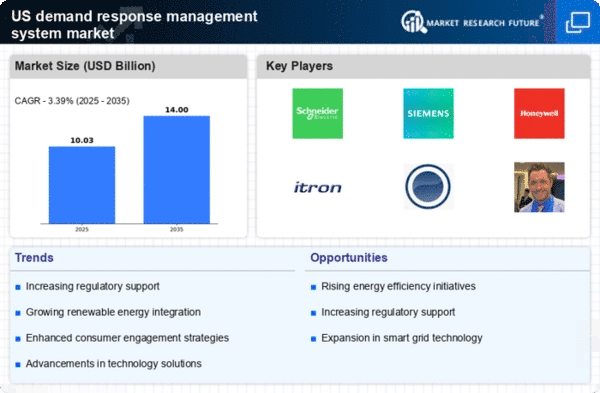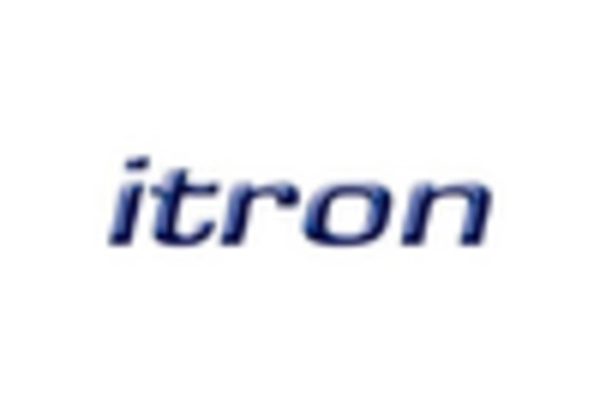Rising Electricity Costs
Rising electricity costs are compelling consumers and businesses to explore demand response-management systems as a viable solution. With electricity prices in the U.S. experiencing an upward trend, driven by factors such as increased demand and aging infrastructure, the need for cost-effective energy management solutions is more pressing than ever. According to the U.S. Energy Information Administration, residential electricity prices have risen by approximately 5% over the past year. This economic pressure encourages users to adopt demand response strategies that can mitigate costs by shifting energy usage to off-peak times. As a result, the demand response-management-system market is likely to see increased adoption as stakeholders seek to manage their energy expenses more effectively.
Increased Energy Efficiency Initiatives
The demand response-management-system market is experiencing growth due to heightened energy efficiency initiatives across the United States. Government programs and utility incentives are increasingly promoting energy-saving technologies, which encourage consumers to adopt demand response solutions. For instance, the U.S. Department of Energy has set ambitious targets to reduce energy consumption by 20% by 2030. This push for efficiency not only helps in reducing operational costs for businesses but also aligns with sustainability goals. As organizations seek to optimize their energy usage, the demand response-management-system market is likely to benefit from this trend, with projections indicating a potential market growth of over 15% annually in the coming years.
Integration of Renewable Energy Sources
The integration of renewable energy sources into the grid is a significant driver for the demand response-management-system market. As the U.S. transitions towards cleaner energy, the need for systems that can manage variable energy supply becomes critical. The Energy Information Administration reports that renewable energy sources accounted for approximately 20% of total U.S. electricity generation in 2025. This shift necessitates advanced demand response solutions to balance supply and demand effectively. Consequently, the demand response-management-system market is poised for expansion, as utilities and consumers alike seek to leverage these systems to enhance grid reliability and reduce reliance on fossil fuels.
Technological Innovations in Smart Grids
Technological innovations in smart grid infrastructure are significantly influencing the demand response-management-system market. The deployment of smart meters and advanced communication technologies enables real-time data exchange between utilities and consumers, facilitating more efficient energy management. The U.S. government has invested heavily in smart grid technologies, with funding exceeding $4 billion in recent years. This investment is expected to enhance grid resilience and improve demand response capabilities. As smart grid technologies continue to evolve, the demand response-management-system market is likely to expand, providing users with enhanced tools for energy management and consumption optimization.
Growing Awareness of Environmental Impact
Growing awareness of environmental impacts associated with energy consumption is driving interest in the demand response-management-system market. As consumers become more conscious of their carbon footprints, there is a notable shift towards sustainable energy practices. This trend is reflected in the increasing number of businesses committing to carbon neutrality and sustainability goals. The U.S. Environmental Protection Agency reports that energy efficiency measures can reduce greenhouse gas emissions by up to 30%. Consequently, demand response-management systems are being recognized as essential tools for achieving these environmental objectives, leading to a projected increase in market adoption as organizations seek to align their operations with eco-friendly practices.
















